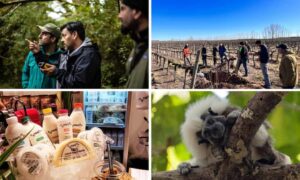
Leo Prieto’s passion for nature started during his childhood by the sea. “I was obsessed with what was under the surface. I’d anchor myself to a rock with my snorkel, and I was fascinated by all the little animals doing things that go unnoticed.”
His teenage years coincided with the arrival of the internet in Chile, where he became a web pioneer, launching and selling several startups. Inevitably, his interests in the environment, the internet and business merged, driven by the feeling that technological advances should not be wasted.
“We’re living at a time when science and technology allow us to do almost anything, and we’re spending all that energy, all those resources, helping people put cat ears on a photo. Really?!” says the entrepreneur.
“Why don’t we use all these advances to solve actual problems? We have real issues, and we have real tools – let’s combine the two.”
Prieto is one of a growing number of entrepreneurs in Latin America and the Caribbean embracing the green revolution and establishing businesses and non-profit initiatives focused on conservation, the green economy, and climate justice. Many of them feel the international community and world leaders are failing to fund climate projects sufficiently.
Change is becoming increasingly urgent as the region’s 33 countries are some of the most vulnerable to the impact of the climate crisis, both economically and physically.
Environmental innovation is a sector with significant growth potential for Latin America and the Caribbean, say experts. According to a recent report by the Inter-American Development Bank, the value added by the green economy – renewable energy, environmental technologies and bioeconomy – is growing. One of the biggest challenges is funding, and a large tranche of projects aim to kickstart the sector by connecting investors with environmentally and socially responsible projects.
In Chile, Prieto’s startup, Lemu, uses artificial intelligence (AI) and machine-learning technology to create a marketplace where potential investors can find climate, biodiversity, water and human development schemes in need of capital.
Lemu – a Mapuche word meaning forest – checks each project to ensure it has verifiable results before including it on the list. Users can read about the projects, search by country or species being protected, navigate maps and 3D models, and monitor progress through photos and posts.
Among the projects are an initiative to protect cotton-top tamarins, a small critically endangered monkey in Colombia under threat from deforestation and the illegal wildlife trade, and rhinos being protected from poachers in the Sibuya Game Reserve in South Africa.
The app offers the option of making monthly or one-off donations and provides updates and impact reports. Featured projects receive 80% of each donation – Lemu keeps 19% to cover its costs and growth and the remainder goes to 1% for the Planet, which commits member companies to donating at least 1% of annual sales to environmental organisations.
